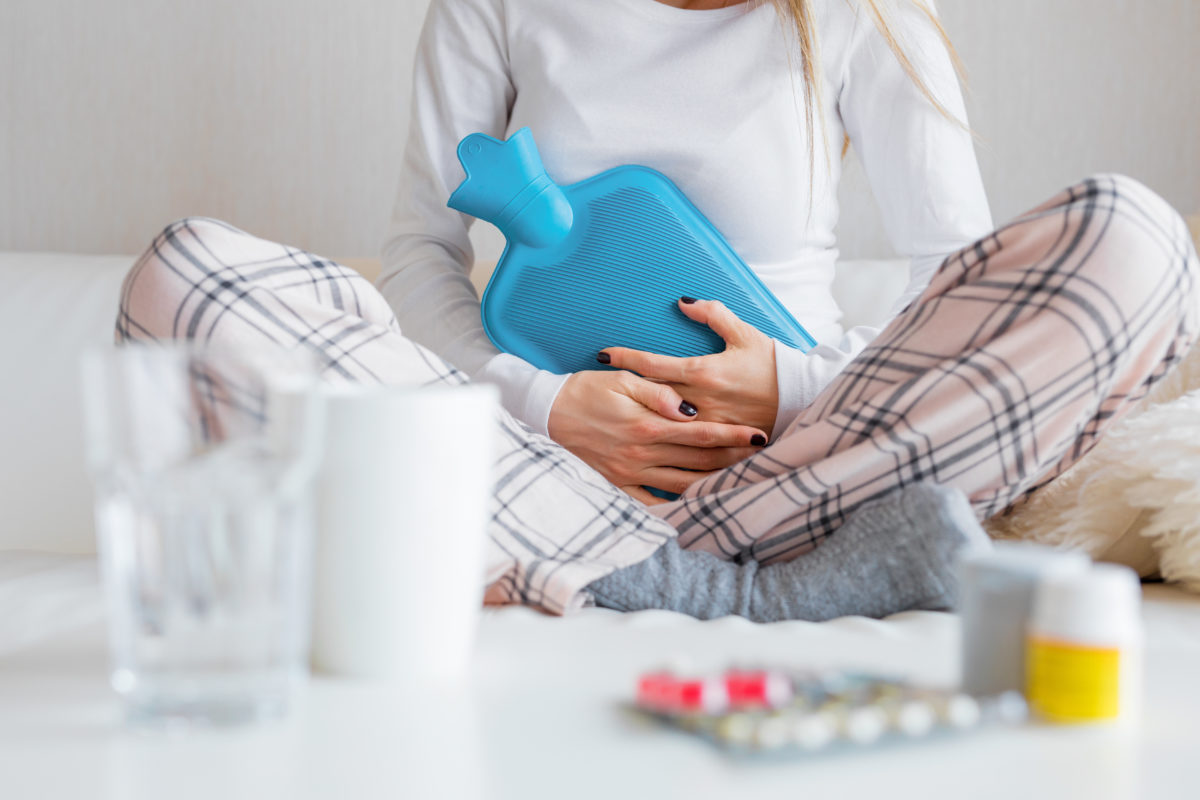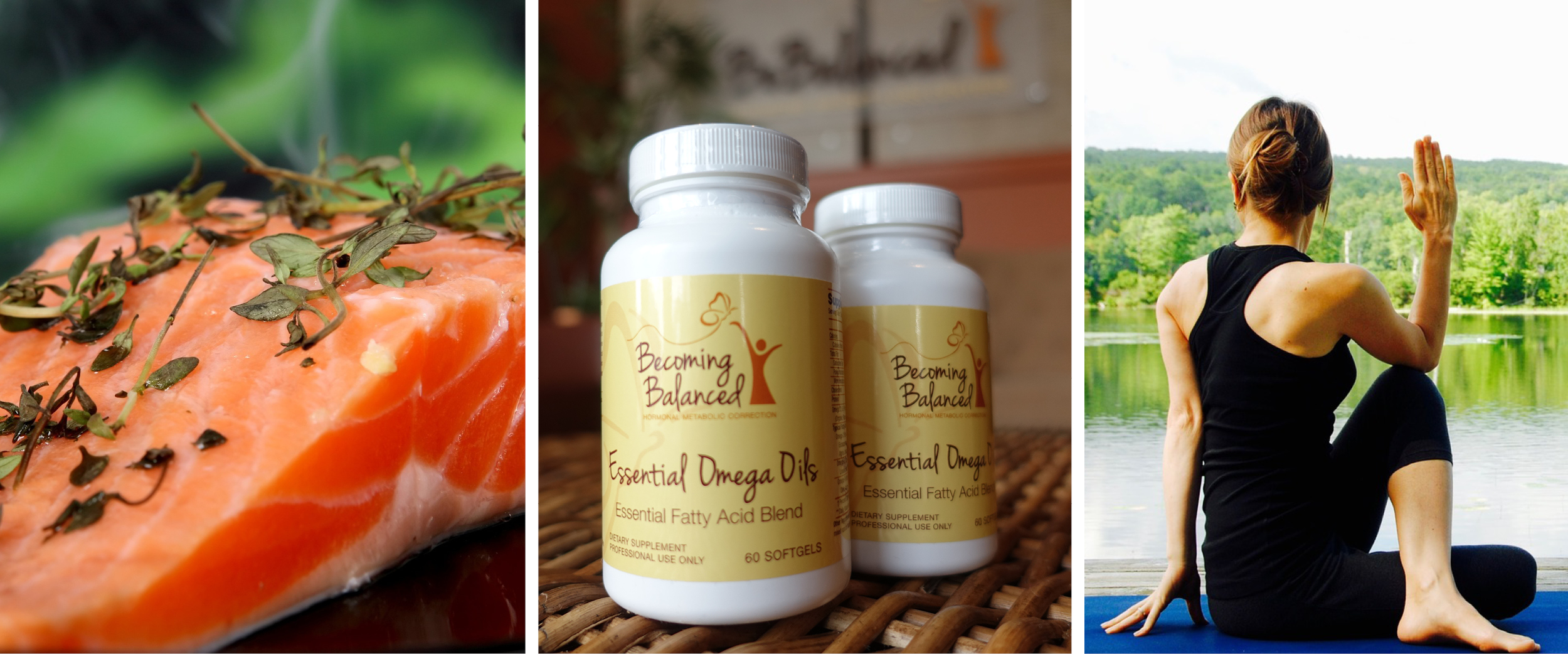
You are not destined to feel uncomfortable and miserable!
We’ve all been there. It’s that time of the month and our bodies (and brains) seem to go haywire. We have breast tenderness, we feel puffy and bloated, we experience terrible cramps, and on top of it, we don’t know if we want to cry or scream at the drop of a hat. So, what gives? Are we destined to deal with these PMS symptoms’ month after month? And then, once we finally stop getting our period, will we finally have relief? Or, will we start to take on new symptoms such as increased bloating coupled with night sweats, hot flashes, weight gain, and an overall lackluster feeling about ourselves? Sounds ominous and downright depressing!
The truth is you are not destined to live that way!
Your body is a masterpiece!
First off, let’s start by reminding you that your body is a work of art. It’s an amazing combination of intricate parts all working together to function and keep you alive. It’s a perfectly created machine that is designed for optimal function. But it does require something from you. For your body to work at its best, it needs you to take care of it from the inside out. Your body needs nutrients, quality real foods, and adequate hydration. It requires a break now and then from mental and physical stress. Your body craves movement, exercise, and fresh air. It needs healthy relationships and mental stimulation. Above all, it needs to be treated with the utmost respect and care.
Can I reverse the damage?
So, what happens when we haven’t spent our entire lives taking the proper care of our bodies? It rebels, overcompensates, and it becomes imbalanced in an effort to make up for the lack of what it has needed and craved.
But here’s the great news – your body is so amazing that you can help it to reverse any damage or imbalance and help it begin to heal and function at its best at any point you choose.
What is causing my PMS and Menopause symptoms?
So, what causes most women to have such uncomfortable symptoms around their period or during perimenopause and menopause? Simply put – an imbalance of key hormones, mainly estrogen and progesterone.
During your monthly cycle, your hormones naturally fluctuate. A shift in these hormones can lead to both physical and emotional symptoms. During perimenopause, your hormones are changing rapidly. In fact, by the time most women reach menopause, their progesterone levels drop by 80%, while estrogen only drops about 20%, leaving a more significant imbalance between estrogen and progesterone, called estrogen dominance.
Changes in hormone levels also influence your neuro-chemicals, dopamine, and serotonin, which help regulate your mood, sleep cycle, and appetite. Low levels of dopamine are linked to feelings of sadness and go hand in hand with higher serotonin levels which are linked to depression, both commonly related to PMS.
When estrogen is out of balance, it can also trigger fluid retention resulting in bloating, breast tenderness and migraines. In addition, out-of-balance estrogen levels cause female issues including heavy periods, fibroids, endometriosis, and even some female cancers.
Progesterone, on the other hand, is a natural fat-burner and diuretic that soothes mood, nurtures sleep and calms PMS and menopausal symptoms. Progesterone also helps to balance out blood pressure and blood sugar levels.
What causes my hormones to become imbalanced?
The reasons for why your hormones become imbalanced in the first place comes in a long list. The main culprits are often a result of:
- Chronic stress
- An imbalanced diet high in sugars and processed foods
- Foods that contain hormones
- Autoimmune issues
- Birth control pills
- Traditional Hormone Replacement Therapy (HRT)
- Environmental toxins
- And inflammation
What can I do to help symptoms related to my PMS or menopause?
Eat a hormone and blood sugar balancing diet rich in quality protein, fiber, nutrients, and healthy fats.
Fueling your body with these foods will help to balance your blood sugar, keeping craving at bay and stabilize your mood and energy levels. Start your day off right by eating protein, such as a protein shake, eggs, and nut butters, for breakfast. Throughout the day, increase fiber in your diet from vegetables, fruits, nuts, seeds, and beans. Fill up on organic food, especially animal products, to avoid environmental estrogens from pesticides.
Avoid processed foods, damaged fats, excess caffeine and alcohol, and foods high in sugars and simple carbohydrates.
Although it can be tempting to reach for fried food or desserts, these foods will negatively affect your mood and sleep patterns, especially around your period.
Try cutting out dairy and consider eliminating other common allergens for a few months, especially gluten.
Use the BeBalanced Natural Hormone Balancing Creams, Pro-Plus and Soothe Stress.
By using the BeBalanced creams together, your body will have the building blocks it needs to balance your hormones naturally. Natural Hormone Balancing is a safe, natural, non-medical approach that balances key sex hormones and stress hormones, unlike traditional hormone replacement therapy that can worsen symptoms, cause weight gain, and have been linked to certain female-related cancers. At BeBalanced, we use a combination of natural, plant-based progesterone (the only hormone proven safe for long-term use), DHEA, and herbs like maca to support and rebuild your adrenal glands and combat the negative effects of stress. For more information on our proprietary Natural Hormone Balancing Creams, contact us today to learn more.
Check your regularity and take a magnesium supplement.
One of the ways your body eliminates excess estrogen is through the bowels. If your digestive system is sluggish, the estrogen that the liver excretes into the bile can be reabsorbed into the bloodstream through the intestinal tract. Make sure you are getting plenty of fiber in your diet through vegetables, fruit, and sprouted grains. Try adding a magnesium supplement such as our professional grade BeRegular supplement. Magnesium has been shown to help support digestion, balance mood, calm nerves, and help with headaches and migraines. Researchers found that women who experienced PMS had a lower magnesium concentration in their red blood cells than women who did not experience PMS.
Two tablespoons of ground flax seeds a day are especially helpful in relieving constipation and balancing hormones. Put them in a shake or sprinkle them on salads or food.
Drink at least half of your body weight in ounces of water daily.
Proper hydration will keep bloating and cravings at bay as well as support proper energy levels and bowel movements.
Add Omega essential oils to your diet.
Research shows that adding Omega-3 fatty acids to your diet reduces common PMS symptoms such as depression, anxiety, bloating, tender breasts, headaches, and breakouts. Add plenty of wild caught salmon into your diet our try our Essential Omega Oils supplement. BeBalanced Essential Omega Oils contain a professionally made blend of not only organic Omega-3 but also Omega-6 and 9 fatty acids.
Manage stress.
Practicing daily relaxation techniques is beneficial in all areas of your life, including hormone balance and stress management. Take a hot bath at night, get a massage, go for a walk, try yoga, practice deep breathing or meditation. These techniques and others can help balance hormones and lower stress.
Additional support.
If you are experiencing symptoms related to PMS or menopause, or suffer from constant mood swings, restless sleep, anxiety, stubborn weight, a lowered sex drive, or an overall lack of energy, we are here to help. Our goal at BeBalanced is to help you get back to feeling like the best version of you. We want you to live a life full of energy, joy, positive moods, and an overall sense of well-being. Together we can find out the root cause of your specific symptoms and issues and help you find balance. Contact today to set up a free consultation, or take a minute to see if you may have a hormone imbalance by filling out our free hormone assessment.
Above all, remember, you are not defective! You are a masterpiece. It’s not your fault. It’s your hormones! It’s time to find relief for good.
Be well!




